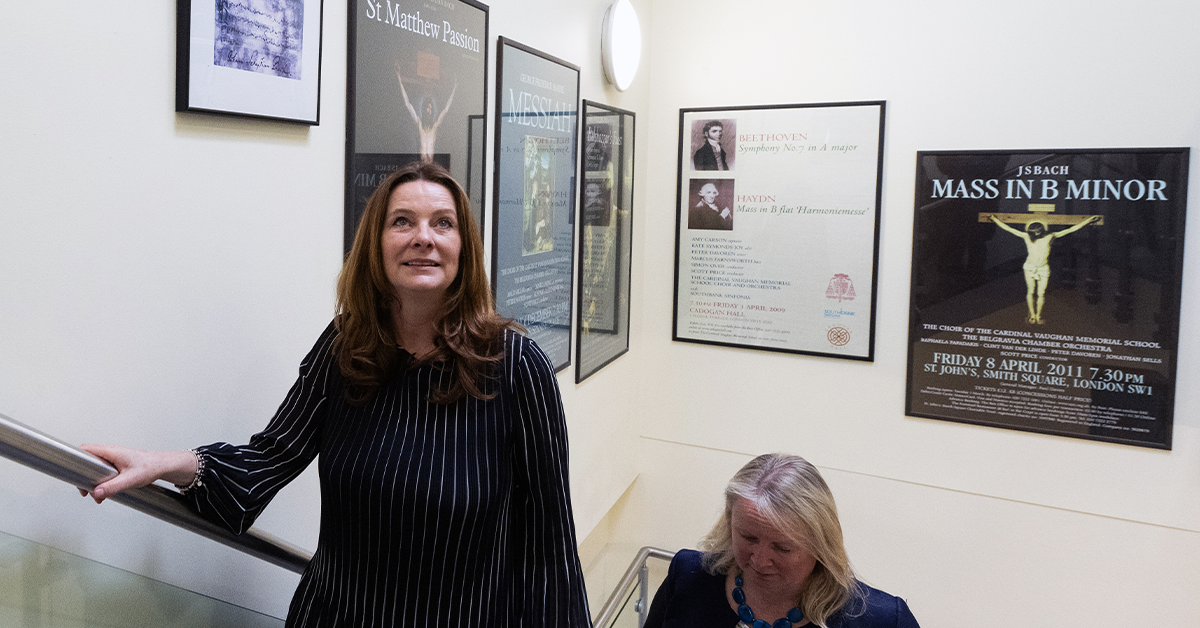
Education Secretary Gillian Keegan announced that the 50% cap on religious admissions to new faith schools that has been in place since 2007 would be scrapped. She made the announcement in a video visiting Cardinal Vaughan Memorial School in Kensington and Chelsea and said the change would allow good school places for more children. But research by Humanists UK has shown that the school is one of the most socio-economically segregated schools in the country with its number of free school meal eligible pupils being significantly lower than mainstream state schools in the Kensington and Chelsea borough and across London as whole.
At Cardinal Vaughan only 11.7% of pupils are eligible for free school meals. This compares to 33% in mainstream state secondary schools in Kensington and Chelsea, and 26% in such schools across London. This makes Cardinal Vaughan one of the most socio-economically segregated schools in England. In 2013 a ranking produced by the Fair Admissions Campaign judged the school to be the 22nd most unrepresentative school of its local area in England. Recent research by the Sutton Trust found that faith schools were ‘consistently more socially selective’ than schools without a religious character, with Catholic schools being the least representative of the population and the least likely to cater to disadvantaged children in their catchment areas.
In general, Catholic secondary schools in London admit 21% of pupils eligible for free school meals, compared to 26% across London. In other words, they admit a fifth fewer.
The reasons for these unrepresentative figures are clear: the school is 100% religiously selective (having opened long before the cap came in) and has highly complex admissions arrangements. Among its many other hard-to-navigate provisions, the 20-page long arrangements see priority given to ‘Catholic boys with a Certificate of Catholic Practice’ which is explained (eight pages later) to mean ‘evidence of baptism’ and ‘a certificate issued by the family’s parish priest… [where] the priest is satisfied that at least one Catholic parent or carer (along with the child, if he or she is over seven years old) have (except when it was impossible to do so) attended Mass on Sundays and holy days of obligation for at least five years (or, in the case of a child, since the age of seven, if shorter)’.
Until 2010, Cardinal Vaughan’s admissions arrangements used to also require ‘regular unpaid commitment’ by parents to the Catholic Church, but the Schools Adjudicator ruled this broke the admissions code, which forbids schools from ‘giv[ing] priority to children on the basis of any practical… support parents may give to… any religious authority.’ Though at that time only three years of church attendance was required, rather than the five now.
Humanists UK Chief Executive Andrew Copson commented:
‘By making her announcement at one of the most socio-economically and religiously segregated schools in the country, the Education Secretary couldn’t have more vividly demonstrated the socially destructive consequences of her flawed policy if she had tried.
‘The Government must stop being blinkered about this: religious segregation by state faith schools means poorer and minority ethnic pupils are excluded and parents lose choices. It should reverse its announcement and instead consider what can be done to improve outcomes for every child.’
Catholic schools and social selectivity
Free school meal eligibility is generally considered to be the best measure for determining how many poorer pupils a school takes in. However the Catholic Church chooses to not focus on free school meal figures in its own communications, instead focusing on how deprived the areas are that its pupils come from. But all the Church is doing is restating that its schools are in cities. Previous analysis has shown that Catholic schools are even more likely to be in deprived areas than their pupils are.
The Church also sometimes likes to point to national comparisons on free school meal eligibility, arguing that its schools have bigger catchment areas than others so local comparisons are looking too closely. But even comparing different schools to others in their government office regions (e.g. the whole of London) finds Catholic schools are highly socially selective.
The main reason the cap is being lifted is because of campaigning by the Catholic Church, claiming that to open new Catholic schools under the cap would break canon law. But this is highly disputable, and at any rate religious laws don’t seem like a good reason to change policy when it undermines social cohesion.
Notes
For further comment or information, media should contact Humanists UK Director of Public Affairs and Policy Richy Thompson at press@humanists.uk or phone 07534 248 596.
Read the Government’s announcement.
Read more about our work on faith schools.
Humanists UK is the national charity working on behalf of non-religious people. Powered by over 120,000 members and supporters, we advance free thinking and promote humanism to create a tolerant society where rational thinking and kindness prevail. We provide ceremonies, pastoral care, education, and support services benefitting over a million people every year and our campaigns advance humanist thinking on ethical issues, human rights, and equal treatment for all.
